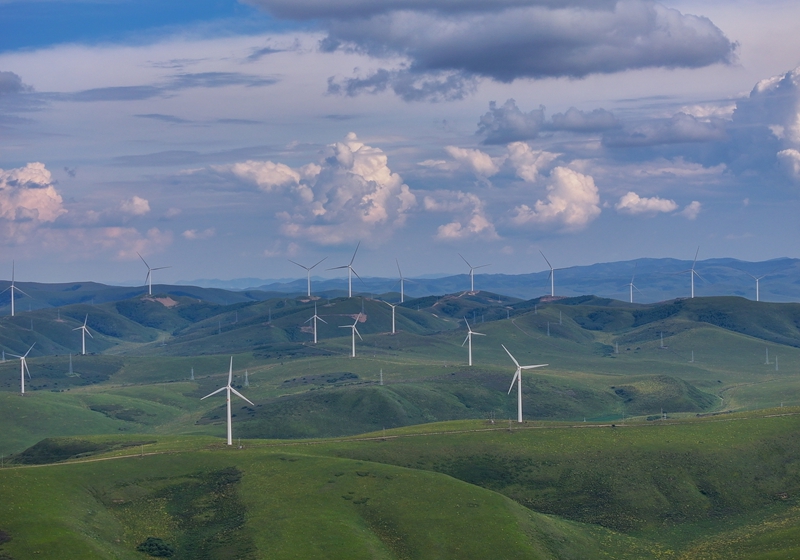
 0 Comment(s)
0 Comment(s) Print
Print E-mail China.org.cn, September 23, 2024
E-mail China.org.cn, September 23, 2024

An aerial drone photo taken on Aug. 17, 2024 shows a wind farm in Tongliao, China's Inner Mongolia autonomous region. [Photo/Xinhua]
Following the conclusion of the 2024 Summit of the Forum on China-Africa Cooperation (FOCAC) in Beijing, there is considerable optimism for green cooperation and clean energy capacity-building in Africa. China's recent energy transition advancements promise important gains for a continent crucial to a truly equitable global transition.
A recently released white paper on China's energy shift details factors that propelled China to become a leading global investor in the field. China's leadership in renewables and clean energy carries significant weight for African countries' energy transformation.
For instance, on the renewables front, China has contributed well over 40% to annual increases in global renewable capacity since 2013 and helped other countries reduce their carbon dioxide emissions.
As China and Africa strengthen their commitment to a greener future, African states can benefit from China's energy transition. China's rapid advancement in new energy technologies has improved global renewable energy access and affordability, particularly in wind power. This matters because wind and solar energy are critical to Africa's own sustainable energy transition.
The complementarity says it all. China's clean energy expertise, coupled with its sizeable exports of wind and solar products in recent years, can enhance China-Africa green cooperation. African states are increasingly adopting solar technologies to power their renewable transition. As a leading global producer of solar cells and modules, China can facilitate this transition, helping African countries access these crucial technologies and markets.
History also reflects a mutual advantage: Chinese investments in Africa's clean energy sector soared by over 25% annually from 2010 to 2020. With such a rich backdrop of clean energy cooperation, optimism is high for both sides to implement 30 newly announced clean energy projects in Africa collectively. These projects can help narrow the distance between Africa and its equitable and just energy future.
The impact of emission reduction on Chinese energy products signals another advantage. Last year, Chinese exports of energy products helped nations slash their CO2 emissions by about 810 million tons. Now, as African countries look to deepen their contributions to a greener future, stronger ties with Chinese energy companies could prove mutually beneficial. For one, these links can increase the continent's access to more low-emission products. To the benefit of both sides, potent linkages between China's fast-expanding new energy industry and African countries already exist. Such collaboration could boost Chinese green product supplies in the future. These joint efforts remain critical to increasing Africa's renewable energy capacity, highlighting the value of China-Africa win-win engagement.
As many developing countries struggle to attract clean energy investments, China-backed "green growth engines" could help Africa narrow its energy accessibility gap. These growth points could help both sides overcome financial bottlenecks in developing new energy facilities while creating green jobs. After all, China's clean energy projects in Africa are expected to add at least 1 million new jobs, making their FOCAC vision a model for sustainable energy action.
The Belt and Road Initiative (BRI) adds another key dimension to renewables cooperation. Through the BRI, China has helped partner countries deepen green energy collaborations and address resource and technical challenges in Africa. Recent developments at FOCAC have injected new momentum into BRI-led green development, building on rising Chinese investments in foreign energy sectors. Similarly, increased capacity-building in renewables could benefit parts of Sub-Saharan Africa lacking reliable energy sources.
The consensus from the 2024 FOCAC Summit was not only receptive to Africa's development needs but also reflected global progress. China's energy transition leadership over the past decade, marked by $676 billion in investments across more than 100 countries, sets the stage for increased renewables support to Africa. This cooperation could spur joint efforts in renewables, conservation, critical minerals and green industry growth.
The relevant groundwork appears in place. China is already leveraging business links, technology sharing and domestic policy targets for sustainable energy development overseas, with Africa as a key priority. The 2024 FOCAC Summit positioned Chinese-produced green technology commodities as an important offering for partner countries. The timing is crucial: More than 600 million Africans lack access to electricity, underscoring the urgency of a green development path that advances livelihoods.
Interestingly, China's domestic policy targets also present lessons for Africa to jointly advance its energy transition. For instance, China's National Energy Administration has already backed green electricity trading, addressing barriers to clean energy access and trade, a critical issue for Africa. Similarly, China's pragmatic approach of phasing out high-emission fuels for low-carbon alternatives presents an ideal opportunity for African states to attract Chinese clean energy investments. This way, both sides could reinforce joint energy transition solutions as shared priorities. The Beijing Declaration of FOCAC states, "China will open its market wider to the least developed countries, including those in Africa and encourage Chinese businesses to increase their direct investment in Africa."
Thus understood, China's profound energy transition achievements stand to bolster closer collaboration with Africa on green development, clean energy, and renewable capacity. By sharing expertise in renewable technologies, facilitating product-sharing and promoting international climate cooperation, China demonstrates a concrete commitment to improving African livelihoods and aiding the continent's green industrial growth.
The author is a foreign affairs commentator, author and recipient of the Fulbright Award.
Opinion articles reflect the views of their authors, not necessarily those of China.org.cn.
Go to Forum >>0 Comment(s)